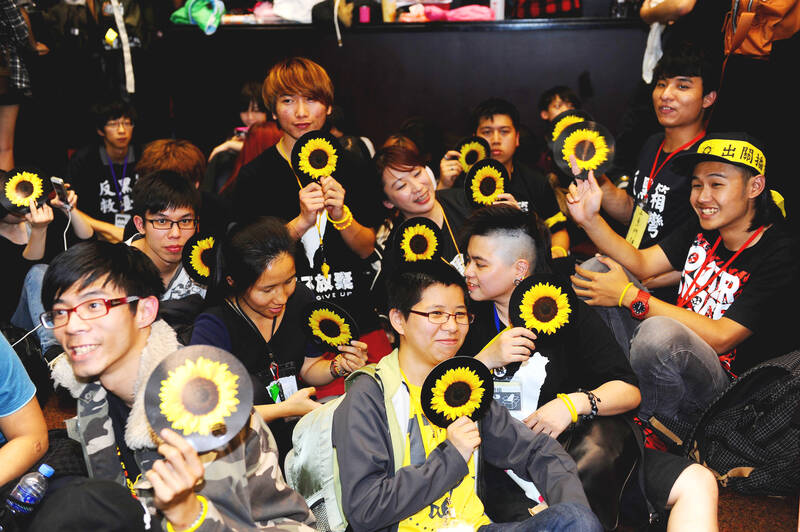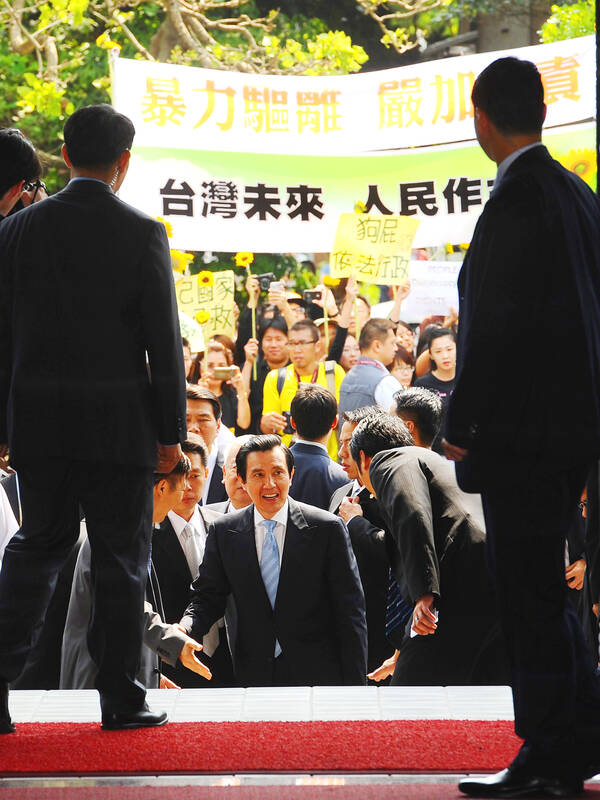If recent polling is any indication, former mayor of Taipei Ko Wen-je (柯文哲) of the Taiwan People’s Party (TPP) and Vice President William Lai (賴清德) of the Democratic Progressive Party (DPP) are running close to each other, with Chinese Nationalist Party (KMT) presidential candidate and New Taipei City Mayor Hou You-yi (侯友宜) stuck in a more distant third and showing no sign of being able to move up.
‘LIGHT BLUE’

Photo: Chen Kuan-pei, Taipei Times
Ko, who has taken up many KMT positions and moved into a “light blue” stance, has been angling for KMT votes by replicating KMT criticisms of the DPP and its policies. Last week he began talking about reviving the services pact with China, killed by the Sunflower movement protests in 2014, and calling for greater exchanges between the People’s Republic of China (PRC) and Taiwan.
He also criticized the DPP for not passing the “cross-strait agreement supervisory act.” According to local TV station TVBS, he asked: “How long has the ‘cross strait agreement supervisory act’ been pending in the Legislative Yuan?” He added: “Despite discussions about it since the Sunflower student movement, the law has yet to be implemented.”
Such a framework, he averred, is necessary for cross-strait exchanges.

Photo: Chang Chia-ming, Taipei Times
That legal framework was first proposed by the Executive Yuan under the administration of former president Ma Ying-jeou (馬英九) in response to public fury over the then-ruling party’s undemocratic handling of the services pact. It was withdrawn by the Executive Yuan when the DPP took power in 2016.
There is a certain irony in Ko aggressively co-opting the language of the KMT while Hou’s campaign, run by the actual KMT, struggles to articulate a message. But both candidates have been cultivating the positioning of Ma in his successful presidential runs in 2008 and 2012.
What else can they do? Two men who ran major cities and left no particular mark on them, are now asking for the capacity to leave no particular mark on the nation.
It thus appears from the campaigns of Hou and Ko that the political imagination of old Taiwanese males struggles to find a space between the pro-Taiwan positions of the DPP and the pro-China positions of the pan-blue camp. Forty years later, the ghosts of former president Chiang Ching-kuo (蔣經國) and the dangwai (黨外, “outside the party”) movement continue their struggle over the future of Taiwan.
Both Hou and Ko could shape the debate by directing it toward discussions of water policy, immigration, civil defense and the economic trifecta of long working hours, stagnant salaries and high housing prices, all areas where the DPP could be made to look indifferent or incompetent. Instead, areas of domestic debate remain quite stereotyped.
Behind this lies the fantasy that if Taiwan only connects harder to China, it will become rich. But recent history suggests just the opposite. The move to China has had a wide range of pernicious effects on Taiwan’s economy and its democracy, as I have noted before (“A different kettle of fish,” in the July 4, 2022 edition of the Taipei Times).
The negative effects of more China linkage drove mass public protests not even a decade ago. At present, polls show that Ko’s support among the young is strong. As several commentators have noted, they feel he is a straight talker who speaks his mind. Could Ko’s push for a renewed services pact change their minds?
A decade ago under Ma, few outside the KMT felt they could trust his drive to bring the People’s Republic of China (PRC) economy closer to Taiwan. A June 2013 Taiwan Indicator Survey Research poll found that just 24.9 percent agreed with the government’s claim that the positive effects of the services pact would exceed its negative impact. Even among KMT supporters, it had only 53.9 percent support. Over 64 percent of the public felt that the pact must be submitted to legislative review. That figure is why the Sunflowers, who occupied the legislature for a month when the KMT tried to make the pact law without a review or vote, using an administrative loophole, had such widespread support.
STRUCTURE OF TRADE PACT
Many have forgotten how the services pact was structured. The agreement opened only services in Fujian Province to Taiwan competition (but all of Taiwan was opened), making Taiwan in effect a territory of Fujian. The pact also opened Taiwan to Chinese financial and service industry investors to move here (for three-year terms with unlimited renewal) and bring their families. It also threatened deeper US-Taiwan economic integration. Commentators pointed out that the pact eliminated WTO protections as well.
As a close analysis by Jang Show-ling (鄭秀玲) of National Taiwan University pointed out at the time, Taiwan then hosted 935,000 service businesses, 85 percent of which were micro-enterprises with less than 5 employees. Few businesses in Taiwan could match the scale of PRC service firms. Moreover, while the government claimed that just 64 service items would be opened to the PRC, in reality well over a thousand industries would be impacted. More than 4 million employees would suffer. Nor would the effects be limited to services: as PRC products flowed into Taiwan through the services conduit, they would destroy Taiwan’s small manufacturing firms as well.
Nothing about those numbers has changed. Indeed, Taiwan’s small service firms, severely impacted by the COVID-19 pandemic, are in an even more perilous state than they were 10 years ago.
Imagine Ko, who is without experience or weight in international relations and trade negotiations, attempting to re-negotiate the services pact with a much angrier, more obdurate and more powerful PRC government, surrounded as he will be by pan-blue “experts.” Ko’s understanding of other countries, history and China is almost entirely that of a conventional man of his generation, as his 2015 interview in Foreign Policy makes clear.
Ko’s insistence that the “cross-strait agreement supervisory act” be passed was probably intended to blunt criticisms that the services pact was undemocratic. The existence of a legal oversight framework will also help blunt criticisms of the services pact inevitable widespread negative effects: “but there was oversight!”
That same spring of 2014, just before the Sunflowers nixed his annexation dreams, Ma was also touting his proposal for “free economic zones” whose effect would have been to adumbrate labor and import protections and flood Taiwan with workers and smuggled products from the PRC.
One wonders how long we will have to wait before Ko comes out with a similar proposal. Industrial zones and science parks are straight out of his childhood, after all.
Why is Ko raising this issue? It’s not just for pan-blue votes, though that is a nice bonus. The services pact was backed by big business and big finance. Ko appears to be angling for the business backing he is going to need if his party is going to become a power.
It’s all about the dollars.
Notes from Central Taiwan is a column written by long-term resident Michael Turton, who provides incisive commentary informed by three decades of living in and writing about his adoptive country. The views expressed here are his own.

That US assistance was a model for Taiwan’s spectacular development success was early recognized by policymakers and analysts. In a report to the US Congress for the fiscal year 1962, former President John F. Kennedy noted Taiwan’s “rapid economic growth,” was “producing a substantial net gain in living.” Kennedy had a stake in Taiwan’s achievements and the US’ official development assistance (ODA) in general: In September 1961, his entreaty to make the 1960s a “decade of development,” and an accompanying proposal for dedicated legislation to this end, had been formalized by congressional passage of the Foreign Assistance Act. Two

March 31 to April 6 On May 13, 1950, National Taiwan University Hospital otolaryngologist Su You-peng (蘇友鵬) was summoned to the director’s office. He thought someone had complained about him practicing the violin at night, but when he entered the room, he knew something was terribly wrong. He saw several burly men who appeared to be government secret agents, and three other resident doctors: internist Hsu Chiang (許強), dermatologist Hu Pao-chen (胡寶珍) and ophthalmologist Hu Hsin-lin (胡鑫麟). They were handcuffed, herded onto two jeeps and taken to the Secrecy Bureau (保密局) for questioning. Su was still in his doctor’s robes at

Last week the Democratic Progressive Party (DPP) said that the budget cuts voted for by the China-aligned parties in the legislature, are intended to force the DPP to hike electricity rates. The public would then blame it for the rate hike. It’s fairly clear that the first part of that is correct. Slashing the budget of state-run Taiwan Power Co (Taipower, 台電) is a move intended to cause discontent with the DPP when electricity rates go up. Taipower’s debt, NT$422.9 billion (US$12.78 billion), is one of the numerous permanent crises created by the nation’s construction-industrial state and the developmentalist mentality it

Experts say that the devastating earthquake in Myanmar on Friday was likely the strongest to hit the country in decades, with disaster modeling suggesting thousands could be dead. Automatic assessments from the US Geological Survey (USGS) said the shallow 7.7-magnitude quake northwest of the central Myanmar city of Sagaing triggered a red alert for shaking-related fatalities and economic losses. “High casualties and extensive damage are probable and the disaster is likely widespread,” it said, locating the epicentre near the central Myanmar city of Mandalay, home to more than a million people. Myanmar’s ruling junta said on Saturday morning that the number killed had